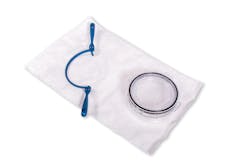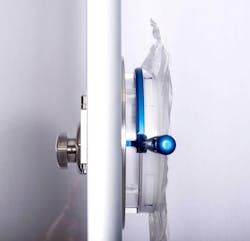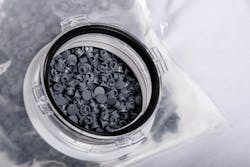In an age where many are quick to promote their ability to “multi-task,” it’s ironic that the trending term within the aseptic manufacturing industry is “single-use.” Namely, single-use as it relates to the incorporation of one-use-only disposable technologies in the manufacture and handling of Life Science products like pharmaceuticals, biologics and biosimilars that feature Active Pharmaceutical Ingredients (API).
The development of these products requires an aseptic manufacturing process — meaning it is free from contamination caused by harmful bacteria, viruses or other microorganisms. For many years, the answer was the installation of a process line populated by multi-use stainless-steel components. Unfortunately, there are drawbacks to this type of setup, including the initial cost for equipment and installation, and a lack of flexibility in product development.
The most significant drawback, though, may be the need for complex, costly and time-consuming validated cleaning systems that are required during product changeovers within manufacturing runs. Single-use systems can eliminate the need for cleaning operations while still helping the process line meet all relevant regulatory-compliance parameters.
Single-use beta bags are one technology that has become increasingly popular in the portfolio of aseptic products for Life Science production applications — specifically sterilization and transfer of components into isolation. This white paper illustrates how these new single-use beta bag models are establishing a higher standard in design, operation and versatility.
The challenge
Keeping products free from contaminants is critical in any aseptic manufacturing process. From sterile API formulation and production to sterile liquid/solid transfer and aseptic filling, sterility must be maintained by meeting stringent requirements at every step to ensure the final product is contaminant-free.
Beta bags are becoming an indispensable link in the aseptic manufacturing chain, in many instances as replacements for their stainless-steel container counterparts. Most beta bag models are constructed of high-grade plastics that are autoclavable or gamma-sterilizable and feature a flange that directly connects to an Alpha port on the isolator, allowing sterilized components to be transferred into the production process.
A shortcoming in the operation of current beta bag brands is they have been designed to be used only with their own proprietary Alpha port systems. This can leave manufacturers with no other options for additional beta bags that may better fit their usage requirements, offer competitive pricing alternatives or allow additional supplier resources.
The solution
Central Research Laboratories (CRL) is an industry leader in the design, development and production of remote-handling and containment solutions used in many Life Science applications around the world. Well-known for its expertise in sterile barrier transfer, CRL has become a leading producer and supplier of Rapid Transfer Ports (RTP). This technology prevents improper operation that can compromise the containment and sterility of the isolated environments and dates back more than 50 years where it was initially used in the nuclear industry for safe and reliable containment of hazardous material. Designed to be used in conjunction with these RTPs, CRL’s latest innovation is the new Single-Use Beta Bag product line.
CRL’s Single-Use Beta Bags undergo a strict construction process. Sheets of Tyvek and a high-density polyethylene (HDPE) plastic are welded together to form a strong bond in this single-layer bag system. Tyvek is a high-density polyethylene fiber that is difficult to tear. It is used as a sterile barrier that allows an autoclave sterilization process to be performed on the beta bags. HDPE has a high strength-to-density ratio, which gives it excellent tensile strength and makes it very resistant to tearing or ripping. The welding of the Tyvek and HDPE sheets takes place in a controlled environment to ensure that a contaminant-free beta bag is produced.
The Single-Use Beta Bags are then welded to an HDPE weld ring that is permanently connected to a polycarbonate flange to complete the beta bag system. This polycarbonate flange is what mates the entire bag assembly to the Alpha port on an isolator. CRL has also developed a Single-Use Beta Bag flange that is compatible with other Alpha port designs currently available to the market. This can be a differentiator for Life Science product manufacturers who would like to have more beta bag options at their disposal.
Conclusion
While it might seem contrary to say that “single-use” beta bags can be called a “multi-tasker,” they do fit the definition in one very significant way — using them can deliver multiple benefits for aseptic-manufacturing processes. Single-Use Beta Bags from CRL go beyond the notable improvements in cost, efficiency and contamination prevention that disposable technologies offer by being compatible with additional styles of Alpha ports. The result is a new standard in single-use beta bag design and usage, allowing for even greater production flexibility.
About the Authors:
Joe Copley is a Product Engineer and Jim Peterson is a Sales Manager for Central Research Laboratories (CRL), Red Wing, Minnesota. They can be reached at [email protected] and [email protected]. CRL possesses more than 70 years of innovation experience in the development of remote-handling systems, including Telemanipulators, Transfer Systems, Glove Ports and Waste Drum Transfer Systems. CRL’s industry-leading technology helps its customers safely and efficiently handle hazardous and sterile materials in nuclear and life science applications around the world.
Destaco, a Dover company, is a global leader in the design and manufacture of high-performance automation, workholding and remote-handling solutions. The company serves customers in a variety of end-markets, including the automotive, life science, consumer packaged goods, aerospace, industrial and nuclear sectors. Destaco is based in Auburn Hills, Michigan, U.S.A. The company has more than 800 employees with 13 locations, in 9 countries, across the Americas, Europe and Asia. Destaco is part of the Engineered Systems market segment within Dover Corporation.
For more information, please visit www.crlsolutions.com, www.destaco.com and www.dovercorporation.com


